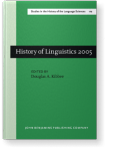The European linguistic tradition and early missionary grammars in Central and South America
The work of early missionary linguists in Central and South America received some criticism in the 19th and 20th centuries. This paper seeks to show that such comments were unfair in that they lacked proper historical contextualization. The first part focuses on the educational background of early missionaries. The second part outlines the theoretical model under which missionary grammarians operated. A perusal of their works reveals that they analyzed exotic languages at two different levels: at a universal or notional level; and at the level of usage or the ways universal features were manifested in particular languages. The third part examines the linguistic terms particleand case within the two-tiered model. The conflicting statements perceived by some modern scholars regarding the application of such terms to linguistic data vanish if one considers such statements within their theoretical framework. Previous linguistic currents have to be judged within their own epistemological framework; otherwise the risk of misrepresentations is great.
Cited by (2)
Cited by two other publications
Valdeón, Roberto A.
2019.
Colonial Conflict and Imperial Rivalries in the Americas. In
The Palgrave Handbook of Languages and Conflict,
► pp. 355 ff.

This list is based on CrossRef data as of 8 july 2024. Please note that it may not be complete. Sources presented here have been supplied by the respective publishers.
Any errors therein should be reported to them.
